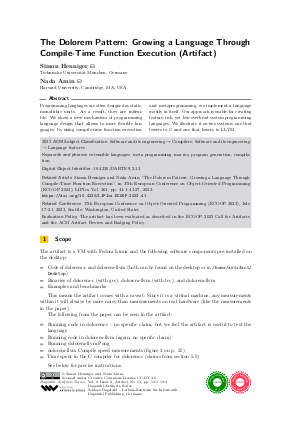The Dolorem Pattern: Growing a Language Through Compile-Time Function Execution (Artifact)
Authors Simon Henniger, Nada Amin
-
Part of:
Issue:
Special Issue of the 37th European Conference on Object-Oriented Programming (ECOOP 2023)
Part of: Volume: DARTS, Volume 9 (ECOOP 2023)
Part of: Conference: European Conference on Object-Oriented Programming (ECOOP)
Part of: Journal: Dagstuhl Artifacts Series (DARTS) - License:
 Creative Commons Attribution 4.0 International license
Creative Commons Attribution 4.0 International license
- Publication Date: 2023-07-11
Artifact Description

PDF
DARTS.9.2.13.pdf
- Filesize: 402 kB
- 3 pages
Document Identifiers
Subject Classification
ACM Subject Classification
- Software and its engineering → Compilers
- Software and its engineering → Language features
Keywords
- extensible languages
- meta programming
- macros
- program generation
- compilation
Metrics
- Access Statistics
-
Total Accesses (updated on a weekly basis)
0Document
0Metadata
Artifact
DARTS-9-2-13-artifact-9b5d480f8227dfbfcaf693506a960fec.ova
(Filesize: 3.07 GB)
MD5 Sum:
9b5d480f8227dfbfcaf693506a960fec
(Get MD5 Sum)
Artifact Evaluation Policy
The artifact has been evaluated as described in the ECOOP 2023 Call for Artifacts and the ACM Artifact Review and Badging Policy
Abstract
Programming languages are often designed as static, monolithic units. As a result, they are inflexible. We show a new mechanism of programming language design that allows to more flexible languages: by using compile-time function execution and metaprogramming, we implement a language mostly in itself. Our approach is usable for creating feature-rich, yet low-overhead system programming languages. We illustrate it on two systems, one that lowers to C and one that lowers to LLVM.
Cite As Get BibTex
Simon Henniger and Nada Amin. The Dolorem Pattern: Growing a Language Through Compile-Time Function Execution (Artifact). In Special Issue of the 37th European Conference on Object-Oriented Programming (ECOOP 2023). Dagstuhl Artifacts Series (DARTS), Volume 9, Issue 2, pp. 13:1-13:3, Schloss Dagstuhl – Leibniz-Zentrum für Informatik (2023)
https://doi.org/10.4230/DARTS.9.2.13
BibTex
@Article{henniger_et_al:DARTS.9.2.13,
author = {Henniger, Simon and Amin, Nada},
title = {{The Dolorem Pattern: Growing a Language Through Compile-Time Function Execution (Artifact)}},
pages = {13:1--13:3},
journal = {Dagstuhl Artifacts Series},
ISSN = {2509-8195},
year = {2023},
volume = {9},
number = {2},
editor = {Henniger, Simon and Amin, Nada},
publisher = {Schloss Dagstuhl -- Leibniz-Zentrum f{\"u}r Informatik},
address = {Dagstuhl, Germany},
URL = {https://drops.dagstuhl.de/entities/document/10.4230/DARTS.9.2.13},
URN = {urn:nbn:de:0030-drops-182532},
doi = {10.4230/DARTS.9.2.13},
annote = {Keywords: extensible languages, meta programming, macros, program generation, compilation}
}
Author Details
Related Article
- Simon Henniger and Nada Amin, "The Dolorem Pattern: Growing a Language Through Compile-Time Function Execution", in 37th European Conference on Object-Oriented Programming (ECOOP 2023), LIPIcs, Vol. 263, pp. 41:1-41:27, 2023. https://doi.org/10.4230/LIPIcs.ECOOP.2023.41
